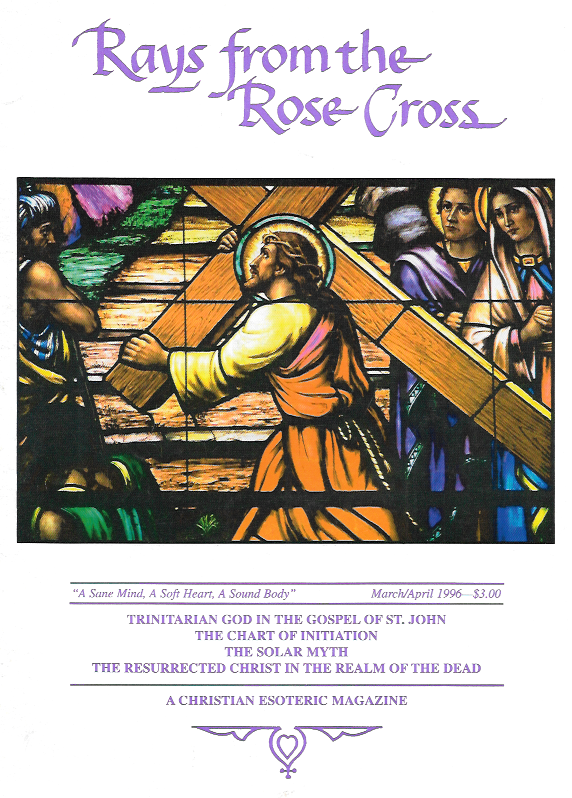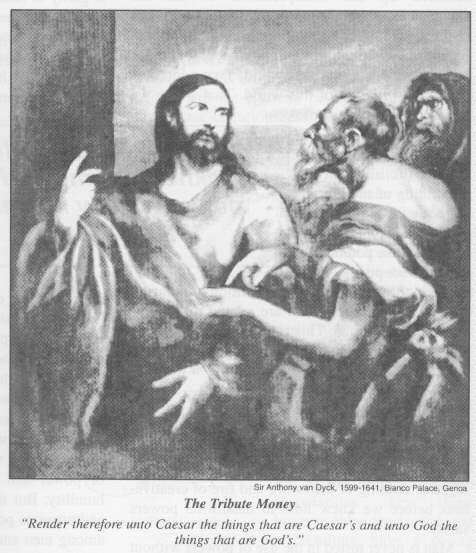Rays From The
Rose Cross Magazine
Western Wisdom
Bible Study
The Eighth
Commandment
As in music, the Eighth Commandment is the octave of the first.
It strikes the same note on a higher level. It is a new beginning.
With the Eighth Commandment, lessons have a new character.
Let us for a moment recapitulate: The Commandments are milestones
on the aspirant's path. The Seventh Commandment outshines all
others so far discussed. It is the sunshine Commandment. In it,
everything we have learned reaches a point of superlative intensity:
not just enjoyment, but thrill; not just love, but exhilaration;
not just sweetness, but vivaciousness; not just "I will,"
but irresistible enthusiasm. When eyes are moist with joy, when
hearts are full to overflowing, when fervor and enthusiasm compel,
that is the Seventh Commandment: attainment, the requisite on
the disciple's path.
Let these qualities be the mark of the aspirant: utter composure,
peace and rest, but also instantaneous enthusiasm, fire, and intensity
in purposeful labors. The measure of our fervor regulates the
fuel that drives the engine of our progress on the path. This
marks the culmination of the Seventh Commandment within ourselves:
the union of the passive and the active, the magnetic and the
electric, body and soul. Without this balance within there is
restlessness and triviality, and without this balance we cannot
reach the Eighth Commandment.
The eighth Commandment was given to Moses for his people at a
time when they had no personal possessions. At that time the Israelites
were migratory; for years past and years to come no one could
call a patch of land his own. Whatever of wealth they had brought
out of Egypt belonged to all alike in a common treasury that was
used and supervised by their leaders. They had only the clothes
on their backs, and there was nothing to steal. Why, then, this
terse Commandment?
This Commandment challenges faculties in man which are above reason
and mundane thought; they belong to the world of Spirit. Christ
Jesus summed up the interpretation of all the Commandments in
the words, "My kingdom is not of this world." The Sabbath
we must keep holy is not of this world. The father and mother
whom we must honor are not of this world. That which we must not
kill is not of this world. That which we must not steal is not
of this world.
In the eighth month of prenatal life, all the actual building
of the physical body is finished; the potentialities of the superman,
the potentialities of adeptship, are added in the body. There
is an addition of points in the sacral vertebrae which are related
to the creative powers in man. This is the particular field of
labor of the Lords of Form, working through Scorpio. In this new
world of Scorpio-a world of challenge to the powers of creativeness-we
find ourselves acting like little children tempted by shiny things.
We rush after the brilliant flame of creative power, only to hurt
and burn ourselves. The fall of man consisted of this undue appropriating,
this stealing of the sword and fire of creativeness before we
knew how to handle its powers safely.
Man is never tested in the use of powers without being instructed
in their control. The tools given us with which to handle the
power of creativeness safely are humility and morality. From little
strands of purity, unselfishness, and generosity, the wise aspirant
weaves the brilliant fire safely. The number eight is called the
little holy number and is associated with the spinal spirit fire.
The strong characteristics of Scorpio, the eighth sign, are great
determination, lofty aspiration, strong love, and heroism. If
we individualize these qualities, we can drive false conceptions,
impurities, weaknesses, and bad habits out of our Temple. These
ignoble qualities betray and steal the high purposes of the superman
within us. Scorpio is the eagle of transmutation; it is the first
sign of self-mastery.
How much power the world has arrogated to itself without the pass-key
of holiness. Humanity is guilty of stealing power; the consequent
suffering is everywhere.
Usurping power has given rise to one pathetically common human
attribute-pride. Therefore Scorpio turns healer by virtue of humility.
Pride sports many premature attainments. Humility, on the other
hand, is the grateful acknowledgment of powers vastly higher than
our own. Humility is a most necessary virtue.
Christ Jesus said: "Render unto Caesar that which is Caesar's."
Similarly, we can say, "Give unto God what is God's."
Thou shalt not steal means: Thou shalt not arrogate, usurp, or
take for your own use that which never belonged, nor ever will
belong, to you, for it is that which in all eternity belongs to
God-His power, His might, His holiness, His right, His order.
If, as aspirants on the path, we sanctify God within our hearts
and attribute all power to Him, we are then blessed with a measure
of power and holiness commensurate with our humility. But if we
consider ourselves sanctified and arrogate power to ourselves
in order to shine among men and greedily rule over them, then
we are thieves and robbers. Whosoever raises himself above his
fellow beings in a hard and self-centered manner transgresses
the Eighth Commandment.
Power is safe only in the hands of the humble. The power of love
is safe only in the heart of the self-controlled and the morally
pure.
Do not steal, for all things come to him who waits, who watches,
who prays.
— Rays from the Rose Cross Magazine, November/December, 1995
This web page has been edited and/or excerpted from reference material, has been modified from its original version, and is in conformance with the web host's Members Terms & Conditions. This website is offered to the public by students of The Rosicrucian Teachings, and has no official affiliation with any organization.


